HEVC vs H.264: A Comprehensive Comparison of Video Codecs
In the past years, video compression technologies have come a long way. Now, this is the most efficient technology for storing and delivering video content on various platforms. The most commonly used video codec is H.264 or also known as H.265. They are really popular for streaming, storing and editing purposes. So, which is better? In this article we will dive into the differences between HEVC vs H264 and pros and cons so you can know which codec to use on your project.
Part 1: What are HEVC and H.264?
H.265 (alternatively HEVC), is a new video compression standard replacement for H.264. It is more efficient form of compression, because it compresses same quality of video to smaller files. HEVC compresses video at the highest resolution, from 4K to 8K; the future of video content and the stream.
AVC is H.264, Advanced Video Coding. Compressed high definition video content is widely used with H.264 video codec. Although not new, HEVC is not as new as it is more widely used because it’s compatible and effective. HEVC vs H264, H.264 is just fine for 1080p and 4K video contents, and the balance is in compression as well as in video quality.
Part 2: Key Differences Between HEVC and H.264
In fact, there are two popular video codecs: HEVC and H.264, which do feature their own minuses and pluses on compression, quality and compatibility. If you know their key differences, you can pick the right codec for your needs.
Compression Efficiency:
The most important difference between HEVC and H.264 is, as yet, compression efficiency. In other words, at a given quality level, H.264 can compress videos at about 50 percent more efficiently than HEVC.
File Size and Storage:
Its greater compression results in a massive size reduction for video files. So, if an H.264-Encoded 4K video occupies 10GB, it will occupy 5GB if encoded by HEVC. This will significantly cut down the storage cost and enable fast uploads of content for online streaming sites.
Video Quality:
HEVC excels in preserving video quality, especially in high-resolution content. While H.264 provides good video quality, HEVC shines when dealing with high bitrate video (e.g., 4K and higher). It delivers better detail and clarity without creating large file sizes, making it ideal for professional-level video content.
Device Compatibility:
H.264 has been developed longer than HEVC, meaning more support on devices, browsers, and software applications. So, from smartphones to a streaming platform, H.264 is universally compatible, while HEVC is relatively newer. HEVC requires more power to decode.
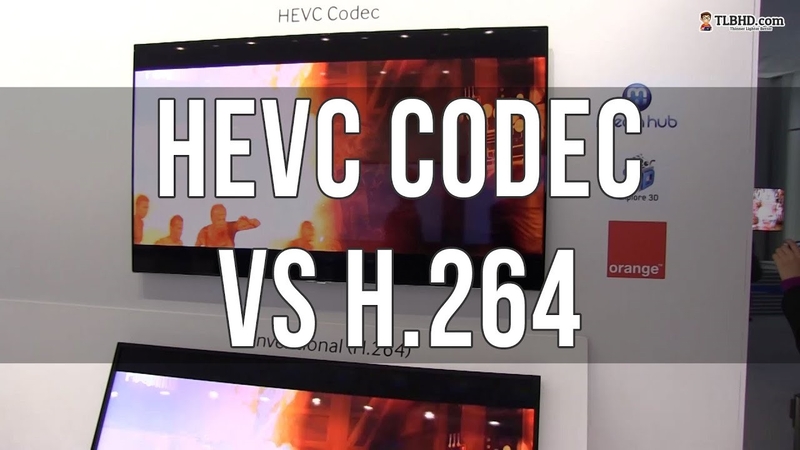
Part 3: Pros and Cons of HEVC vs. H.264
You can decide that which one is best by following pros and cons
HEVC Pros & Cons
Pros
- Superior compression efficiency: HEVC can reduce file sizes while retaining high-quality video.
- Ideal for high-resolution video: Because it’s more efficient at handling 4k, 8k and HDR content, than H.264.
- Future-proofing: With video resolutions increasing, HEVC’s advanced compression makes it possible to have high definition content manageable.
Cons
- High decoding power requirements: HEVC demands more computational resources for playback, which could affect performance on older devices.
- Limited compatibility: While support for HEVC is growing, it is not yet as universally supported as H.264.
- Licensing issues: HEVC’s patent licensing model can make it expensive for some developers and organizations to adopt.
H.264 Pros & Cons
Pros
- Wide compatibility: H.264 is supported by almost all devices, browsers, and video players.
- Efficient for lower resolutions: H.264 provides good compression for 1080p and lower resolution video content.
- Lower computational demand: Since H.264 requires less processing power to decode, it is ideal for devices with limited hardware capabilities.
Cons
- Less efficient compression: H.264 does not compress videos as efficiently as HEVC, leading to larger file sizes for the same quality.
- Not optimal for high-resolution content: It struggles to maintain quality when handling higher resolutions like 4K and 8K.
Part 4: Use Cases: When to Choose HEVC or H.264?
Here are some uses cases to understand when choosing HEVC or H.264.
Streaming Platforms:
If the content quality for this platform is taken into consideration and the target audience, then the choice would be between H.264 and HEVC for streaming. Because of its compression efficiency, HEVC is better suited to streaming 4K or higher resolutions than the other codec alternatives.
Offline Storage:
When it comes to offline storage, HEVC is the preferred codec. Its smaller file sizes make it perfect for saving space on devices or cloud storage. However, if you prioritize compatibility with older media players or devices, H.264 may be the better option, though you'll need more storage space for the same quality.
Editing Workflows:
In video editing, H.264 is often used for final distribution formats because of its fast decoding and compatibility with most editing software. On the other hand, HEVC is gaining popularity in high-end production environments, particularly for 4K or higher resolution projects.
Bonus Tip: Convert between HEVC to H.264
People who need to change between HEVC and H.264 can use HitPaw Univd (HitPaw Video Converter). If you want to either compress your files to make them easier to store or to ensure that your compatibility of your files is able to reach as many devices as possible while keeping the quality of your video files intact, then HitPaw is a breeze and very efficient way of doing this.
Features of HitPaw Univd
- Seamless Codec conversion: Switch from HEVC vs H264 without lossing the video quality and, accordingly, optimal compatibility with several different devices and platforms is available.
- User-Friendly: Simplicity was incorporated in the design of HitPaw's interface, so anybody from a beginner to even professionals can easily make such a conversion.
- Fast and Easy Conversion: HitPaw doesn't take much time at all for converting videos to convert them quickly and on the go.
- Customizable Settings: Video resolution, bitrate, and other settings can be adjusted according to your specific requirements for flexibility in conversions.
- Preservation of Quality: HitPaw ensures that the quality of your video remains intact during the conversion process without any degradation in clarity and detail.
Simple Guide to use HitPaw Univd Functions
Step 1: Launch HitPaw Univd. To import your files, either click the "Add Video" button or drag and drop them directly into the program.
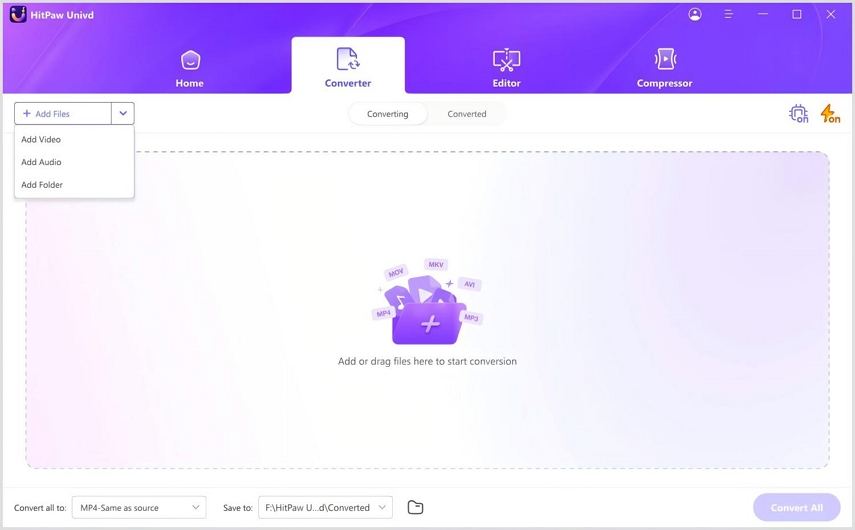
Step 2: If you wish to edit your video's information, click on the file name to change the title.
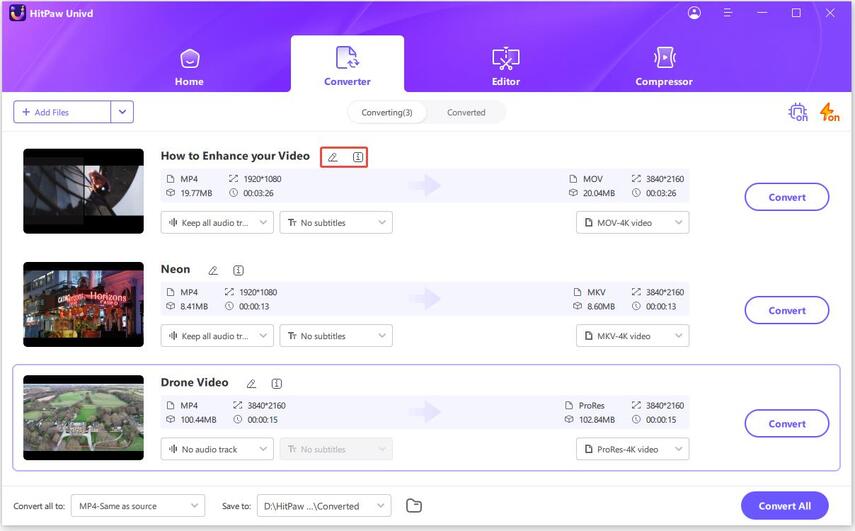
Step 3: Choose an output format for each file by clicking the inverted triangle icon in the lower right corner.
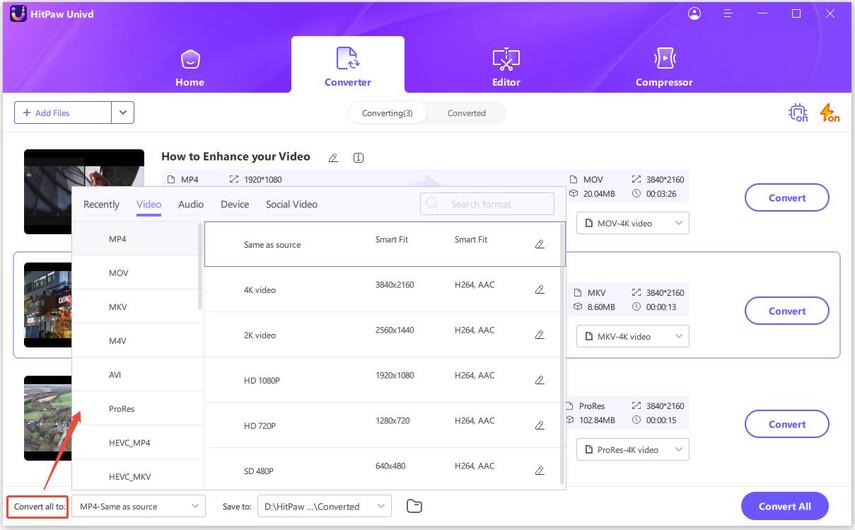
Step 4: To convert your video, select a target folder within the interface and click "Convert" (or "Convert All" if you're converting multiple files). Your video will be processed into the selected format.
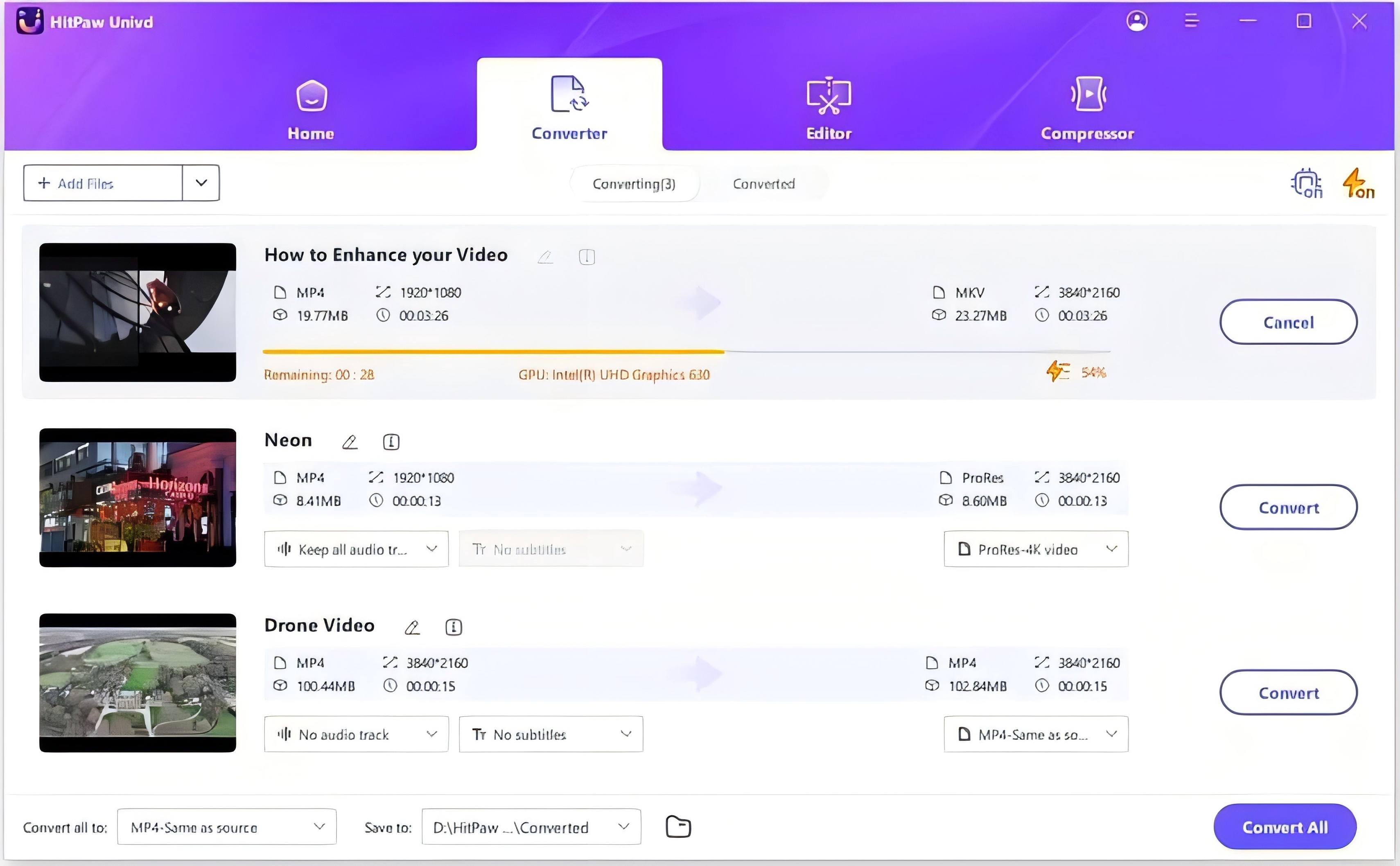
FAQs about HEVC vs. H.264:
Q1. What is the main difference between HEVC and H.264?
A1. The main difference between the two is their compression efficiency. It provides for better compression (use the same video quality, but create smaller file sizes).
Q2. Is HEVC better than H.264 for streaming?
A2. HEVC is better compression, it’s better for streaming high resolution videos like 4K and 8K. It however may not be as universal device support as H.264.
Q3. Can I convert videos from H.264 to HEVC?
A3. Yes, you can convert H.264 videos to HEVC using tools like HitPaw Univd, which allows you to switch between these codecs easily.
Q4. Does HitPaw Univd support both codecs?
A4. Sure, we’d be able to turn an H.264 video file into HEVC with other tools such as HitPaw Univd, which can convert between the two codecs.
Conclusion
HEVC vs H264, both offer distinct advantages depending on your needs. HEVC is ideal for high-resolution content, offering better compression and quality, while H.264 remains a solid choice for compatibility and lower-resolution videos. If you need to convert between these codecs without losing quality, HitPaw Univd is a fantastic option that makes the process simple and efficient. Choose the codec that best suits your video production or streaming needs, and leverage the power of HitPaw to seamlessly manage your files.






 HitPaw Edimakor
HitPaw Edimakor HitPaw VikPea (Video Enhancer)
HitPaw VikPea (Video Enhancer)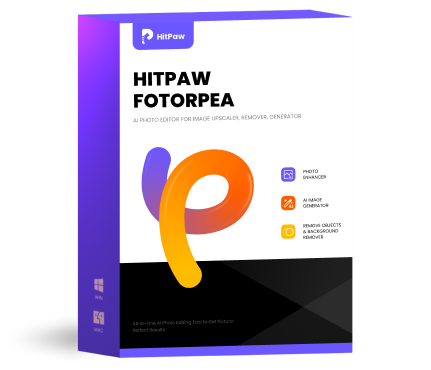 HitPaw FotorPea
HitPaw FotorPea



Share this article:
Select the product rating:
Daniel Walker
Editor-in-Chief
My passion lies in bridging the gap between cutting-edge technology and everyday creativity. With years of hands-on experience, I create content that not only informs but inspires our audience to embrace digital tools confidently.
View all ArticlesLeave a Comment
Create your review for HitPaw articles